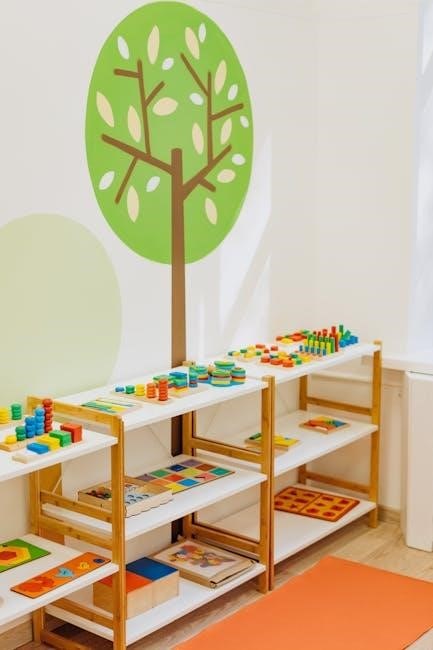Preschool Assessment Forms are essential tools for educators to evaluate children’s development, tracking cognitive, social, and motor skills progress. PDF versions are user-friendly and customizable.
Overview of Preschool Assessment Forms PDF
Preschool Assessment Forms in PDF format are versatile tools designed to track children’s developmental progress. These documents are easily customizable, allowing educators to tailor assessments to specific needs. They often include sections for cognitive, social-emotional, and motor skills evaluation. PDF formats ensure compatibility across devices, making them accessible for both digital and printed use. Many templates offer structured frameworks for recording observations, ensuring consistency in assessments. These forms also facilitate communication between teachers and parents, providing a clear overview of a child’s growth. With options for formal and informal assessments, PDF templates are invaluable for early childhood education, offering a practical way to monitor and support young learners’ development effectively.
Importance of Preschool Assessments
Preschool assessments are crucial for monitoring children’s developmental progress, identifying strengths, and areas needing support. They provide insights into cognitive, social-emotional, and motor skills, helping educators tailor activities to meet individual needs. Regular assessments ensure children are prepared for future educational stages, fostering a smooth transition to kindergarten and beyond. By documenting growth, these tools enable educators to adjust teaching strategies and provide targeted interventions. Additionally, assessments facilitate communication between teachers and parents, ensuring a collaborative approach to supporting each child’s unique developmental journey. Overall, preschool assessments are vital for promoting early learning and laying a strong foundation for lifelong educational success.

The Purpose of Preschool Assessment Forms
Preschool assessment forms evaluate children’s development, track progress, and identify areas needing support, aiding educators and parents in planning interventions and fostering growth, available as customizable PDFs.
Why Assess Preschool-Aged Children
Assessing preschool-aged children helps identify their developmental strengths and areas needing support. It enables educators to track progress in cognitive, social, emotional, and motor skills. Early identification of delays allows timely interventions. Assessments guide teaching strategies, ensuring activities align with children’s needs. They also facilitate communication between teachers and parents, fostering collaboration. Regular evaluations help prepare children for future academic success. Using tools like PDF assessment forms ensures consistency and accessibility. These evaluations provide a foundation for understanding each child’s unique learning journey, promoting personalized growth. By monitoring development, educators can create nurturing environments that support overall child development effectively. Assessments are crucial for laying a strong educational foundation.
Key Developmental Areas Assessed
Preschool assessment forms evaluate critical developmental areas, including cognitive, social-emotional, language, and motor skills. Cognitive assessments focus on problem-solving and memory. Social-emotional skills, like sharing and cooperation, are observed. Language development includes vocabulary and communication. Fine motor skills, such as drawing, and gross motor skills, like running, are also measured. These assessments provide insights into a child’s progress, helping educators tailor activities. They ensure children meet milestones, preparing them for future academic success. By documenting these areas, teachers and parents can identify strengths and areas needing support, fostering holistic growth. Regular evaluations in these domains create a comprehensive understanding of each child’s abilities. This ensures personalized learning experiences.

Types of Preschool Assessment Forms
Preschool assessment forms include formal and informal tools, such as checklists, observation sheets, and skill tests. Digital and printable PDF formats offer flexibility and accessibility for educators.

Formal vs. Informal Assessments
Formal assessments involve standardized tools like checklists and tests, measuring specific skills against benchmarks. They are structured and often documented in PDF formats. Informal assessments are observational, flexible, and spontaneous, used during play or activities. Both methods provide valuable insights, with formal assessments offering detailed progress tracking and informal assessments capturing spontaneous development. Educators often combine these approaches to get a comprehensive understanding of a child’s abilities. PDF templates make it easy to organize and share both types of assessments, ensuring effective communication between teachers and parents.
Digital and Printable Assessment Tools
Digital and printable assessment tools offer flexible solutions for evaluating preschoolers. PDF formats are popular for their ease of use and customization, allowing educators to adapt assessments to specific needs. Digital tools, such as editable templates in Google Docs or DotX, enable real-time collaboration and seamless sharing with parents. Printable versions provide a tactile approach, ideal for hands-on activities and observations. Both formats ensure consistency in tracking developmental milestones like fine motor skills and language development. By combining digital accessibility with the practicality of print, educators can efficiently monitor progress and support individualized learning plans. These tools enhance communication between teachers and parents, fostering a collaborative approach to early childhood education.

Creating Effective Preschool Assessment Forms
Effective preschool assessment forms include essential sections like developmental milestones, observation checklists, and parent feedback. These tools support personalized learning plans and holistic child development tracking.
Essential Sections to Include
Effective preschool assessment forms should include sections for developmental milestones, skill assessments, and observation checklists. These tools help track progress in cognitive, social-emotional, and motor skills. Additionally, forms should incorporate areas for parent-teacher communication, allowing collaboration on a child’s growth. Including customizable fields ensures the forms adapt to individual needs and learning styles.Clear and structured sections enable educators to document observations accurately, providing a comprehensive overview of a child’s development. These elements ensure the assessment process is thorough, supporting meaningful feedback and tailored learning plans. By organizing information clearly, preschool assessment forms become invaluable resources for educators and parents alike.
Customizing Assessment Templates
Customizing preschool assessment templates ensures they meet specific classroom or institutional needs. PDF formats allow educators to easily modify sections, such as adding or removing assessment criteria. Including student-specific goals and developmental benchmarks tailors the evaluation process; Educators can also incorporate visual aids or checklists for clearer documentation. Additionally, templates can be adapted to align with curriculum standards or learning objectives. Customization enhances the effectiveness of assessments, making them more relevant and actionable. By personalizing templates, educators can better support individual learning journeys and communicate progress with parents effectively. This flexibility ensures that assessments remain dynamic and responsive to the unique needs of each child and classroom environment.

Using Preschool Assessment Forms Digitally
Digital assessment tools streamline the evaluation process, allowing real-time data entry and sharing. PDF formats are ideal for mobile devices, ensuring accessibility and ease of use for educators and parents.
Benefits of Digital Assessment Tools
Digital assessment tools offer unparalleled convenience and accessibility for educators and parents. PDF formats ensure compatibility across devices, enabling seamless sharing and collaboration. These tools save time by eliminating manual data entry, reducing paperwork, and organizing information efficiently. They also provide instant access to progress tracking, making it easier to monitor developmental milestones. Digital assessments facilitate real-time collaboration between teachers and parents, fostering a cohesive approach to a child’s education. Additionally, they allow for quick updates and customization, ensuring assessments remain relevant and effective. By streamlining the evaluation process, digital tools enhance the overall quality of preschool assessments, making them more efficient and impactful for both educators and families.
How to Use Assessment Templates in PDF Format
Using PDF assessment templates is straightforward and efficient. First, download the desired template from a trusted source. Open the file using a PDF viewer or editor, such as Adobe Acrobat, to fill in the necessary information. Customize fields like the child’s name, dates, and specific skills being assessed. Save the completed form digitally or print it for physical records. For recurring assessments, use editable templates to update progress over time. Many PDF tools allow annotations, making it easy to add notes or highlights. Finally, share the completed forms with parents or colleagues via email or cloud storage. Regularly saving and organizing these documents ensures easy access for future reference and tracking developmental milestones effectively.

Examples of Preschool Assessment Forms PDF
Examples include Cognitive and Motor Skills Assessment Sheets and Social-Emotional Development Tracking Forms. These PDF forms help evaluate skills like color recognition, counting, and fine motor abilities in preschoolers.
Cognitive and Motor Skills Assessment Sheets
Cognitive and Motor Skills Assessment Sheets are designed to evaluate preschoolers’ abilities in problem-solving, memory, and physical coordination. These PDF forms include tasks like shape recognition, color identification, and fine motor exercises. They help educators track developmental milestones, ensuring children meet age-appropriate standards. The assessments often feature checklists and observation sections, allowing teachers to document progress accurately. By focusing on these skills, educators can identify areas needing support and plan targeted activities. These tools are invaluable for creating personalized learning plans and fostering overall child development. Their structured format makes them easy to use and share with parents, ensuring a collaborative approach to early education.
Social-Emotional Development Tracking Forms
Social-Emotional Development Tracking Forms are crucial for monitoring preschoolers’ emotional growth and social interactions. These PDF tools assess skills like sharing, cooperation, and self-regulation. They include observation checklists and rating scales to evaluate how children express emotions, resolve conflicts, and demonstrate empathy. Teachers use these forms to identify areas where support may be needed, fostering a positive classroom environment. By tracking progress, educators can provide tailored strategies to enhance social-emotional learning. These forms also facilitate communication with parents, ensuring a unified approach to the child’s development. Regular use of these tools helps build a strong foundation for lifelong social and emotional well-being, essential for academic and personal success.
Preschool assessment forms are valuable tools for tracking developmental progress. They provide insights into skills, strengths, and areas needing attention, fostering collaboration between educators and parents effectively.
Final Thoughts on Preschool Assessment Forms
Preschool assessment forms are indispensable tools for early childhood education, offering a comprehensive view of a child’s developmental progress. They enable educators to identify strengths, areas for improvement, and provide tailored support. By using PDF formats, these forms are easily accessible, customizable, and shareable among stakeholders. Regular assessments ensure that children receive the guidance they need to thrive academically and socially. Parents and teachers can collaborate effectively, fostering a supportive learning environment. Ultimately, preschool assessment forms play a crucial role in laying a strong foundation for future educational success, making them a vital resource for every early childhood program.
Best Practices for Effective Assessment
Effective preschool assessments require a balanced approach, combining both formal and informal methods. Using PDF templates ensures consistency and ease of use. Observing children during play and learning activities provides authentic insights into their abilities. Regular documentation helps track progress over time, while involving parents through shareable reports fosters collaboration. Customizing assessment tools to meet individual needs ensures each child’s development is accurately captured. Storing assessment data securely is also crucial for maintaining confidentiality. By following these practices, educators can create a comprehensive and supportive assessment process that benefits both children and educators alike, promoting a child-centered approach to early education.
